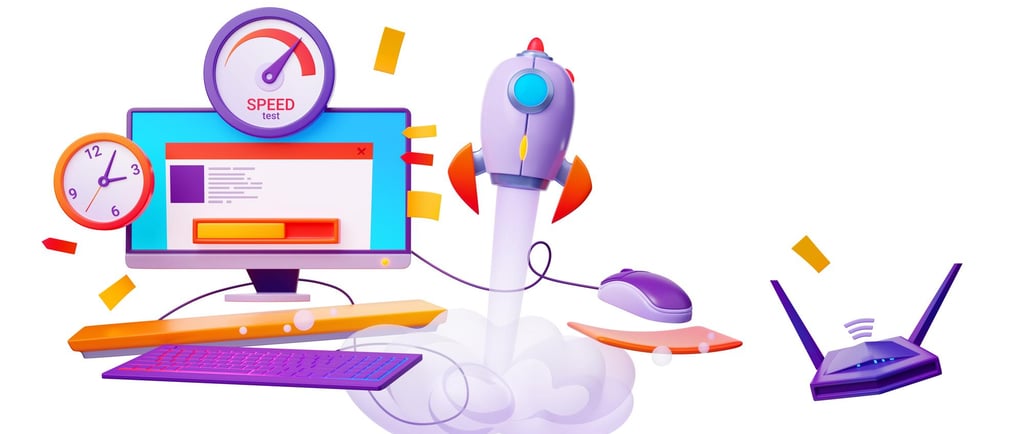What's a good processor speed for a laptop?
Discover ideal laptop processor speeds for daily tasks, gaming, multitasking, and future-proofing your device. Find the perfect balance for your needs!
TRENDING
Nikhil
3/25/20254 min read


The Importance of Laptop Processor Speed
When choosing a laptop, one of the most crucial factors to consider is the speed of the processor. The processor acts as the brain of your machine, impacting overall system performance and efficiency.
In today's fast-paced digital world, a powerful processor can significantly enhance your productivity, whether you're working on complex tasks, gaming, or engaging in graphic design.
Understanding Processor Speed Measurements
Processor speed measurements are essential for evaluating a computer's performance, and they typically revolve around the clock speed of the CPU, which is measured in gigahertz (GHz). This measurement indicates how many cycles per second the processor can execute, meaning that a higher GHz value generally suggests a faster processor capable of handling more tasks simultaneously. However, it's crucial to recognize that clock speed is not the sole determinant of a processor's performance.
Factors such as the number of cores, architecture, and cache size also play significant roles. Modern CPUs often come with multiple cores, allowing them to perform several operations at once, which can vastly improve efficiency for multitasking and resource-intensive applications. Additionally, advancements in technology have led to more sophisticated architectures that improve performance without necessarily increasing clock speed, showcasing the complexity of what truly defines processor performance.
What affects Laptop Processor Speed?
The speed of a laptop processor is determined by several factors including the number of cores, clock speed, and the architecture of the processor. Generally, more cores and higher GHz indicate a faster processor.
For instance, a quad-core processor with a clock speed of 3.0 GHz will perform better than a dual-core processor running at 2.5 GHz under demanding tasks. Moreover, newer architectures can execute instructions more efficiently, offering better performance even at lower clock speeds.
How to choose the right processor for your laptop?
Identifying the best processor speed for your needs heavily depends on what you plan to use your laptop for. For everyday tasks like web browsing, streaming, and word processing, an Intel Core i3 or Ryzen 3 processor may suffice. However, for more intensive tasks such as video editing and gaming, investing in an Intel Core i7 or Ryzen 7 laptop might be a better choice. These processors not only enhance speed but also provide better multitasking capabilities.
Aside from processor speed, consider other elements such as RAM and storage options. A laptop with an SSD will generally boot and load applications faster than a traditional HDD, further improving performance. In summary, understanding the speed of your laptop's processor, alongside other hardware components, is essential when selecting a machine that meets your requirements.
Recommended Speed for Daily Tasks
When it comes to selecting a processor for daily tasks, such as browsing the web, working with office applications, and streaming media, a speed of around 3.0 GHz is typically sufficient for most users. This level of performance strikes a balance between speed and efficiency, allowing for smooth operation without excessive power consumption or heat generation.
For users who engage in more demanding tasks, like gaming, video editing, or running resource-heavy software, it is advisable to consider processors with higher speeds, typically in the range of 3.5 GHz or more, along with additional cores. This combination enables better handling of multitasking scenarios and enhances overall responsiveness.
Ultimately, the optimal processor speed will depend on individual usage patterns and needs, making it important for users to assess their specific requirements before investing in a new computer or upgrading an existing one.
How to Choose a Gaming Processor?
In the world of gaming, speed is not merely a luxury; it is a necessity that significantly impacts the overall experience. As games become increasingly complex and graphics-intensive, the demand for higher bandwidth has surged. Modern games often feature expansive open worlds, intricate graphics, and real-time multiplayer capabilities, which require robust internet connections to function optimally.
A high-speed connection minimizes lag, reduces latency, and ensures smooth gameplay, allowing gamers to react in real-time without frustrating interruptions. Furthermore, with the rise of streaming platforms, many gamers now prefer to broadcast their gameplay live, which demands even greater upload speeds. Consequently, players are encouraged to invest in high-speed internet options, such as fiber-optic connections, to meet these evolving demands and enhance their gaming performance.
Multitasking: Finding the Right Balance
Multitasking has become an essential skill, particularly for those who juggle various online activities simultaneously. Whether it's streaming a video while playing a game, conducting research for work, or participating in video calls, the ability to efficiently manage multiple tasks is crucial. However, finding the right balance is key. Excessive multitasking can lead to decreased productivity and cognitive overload, making it challenging to focus on any one task effectively. To optimize multitasking, individuals should prioritize their tasks, allocate specific time slots for each activity, and utilize tools that help streamline their workflow. By adopting a more structured approach to multitasking, one can enhance efficiency and maintain high levels of performance across diverse responsibilities.
Future-Proofing: Choosing Speed for Longevity
As technology continues to advance at an unprecedented pace, future-proofing has become a crucial consideration for both individuals and businesses. When it comes to internet speed, investing in higher bandwidth is a strategic move that ensures longevity and adaptability in a rapidly changing digital environment.
Higher speeds not only accommodate current needs—such as streaming high-definition content or supporting multiple devices—but also prepare users for future demands as technology evolves.
For instance, as virtual reality (VR) and augmented reality (AR) applications gain traction, their bandwidth requirements will likely increase significantly. Therefore, selecting a high-speed internet plan today can mitigate the need for frequent upgrades in the future, ultimately saving time and money.
By prioritizing speed and scalability, users can confidently navigate the digital landscape, prepared for whatever advancements lie ahead.
Services
New Desktop
New Brand Laptop
Repairing
Maintenance
Contact
k2computer19@gmail.com
+91 7798662861
© 2025. All rights reserved.
